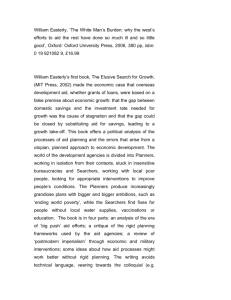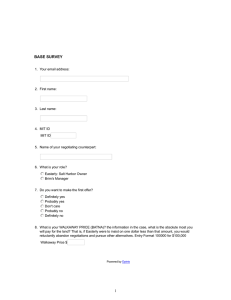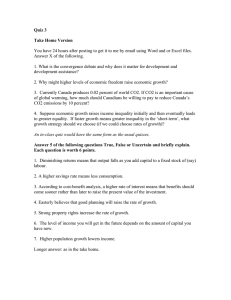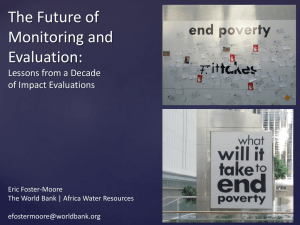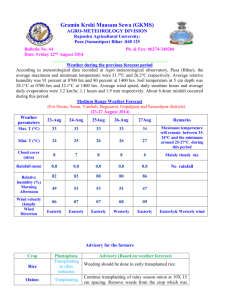University of Vermont Environmental Program and The School of Natural Resources _____________________________________________________________
advertisement
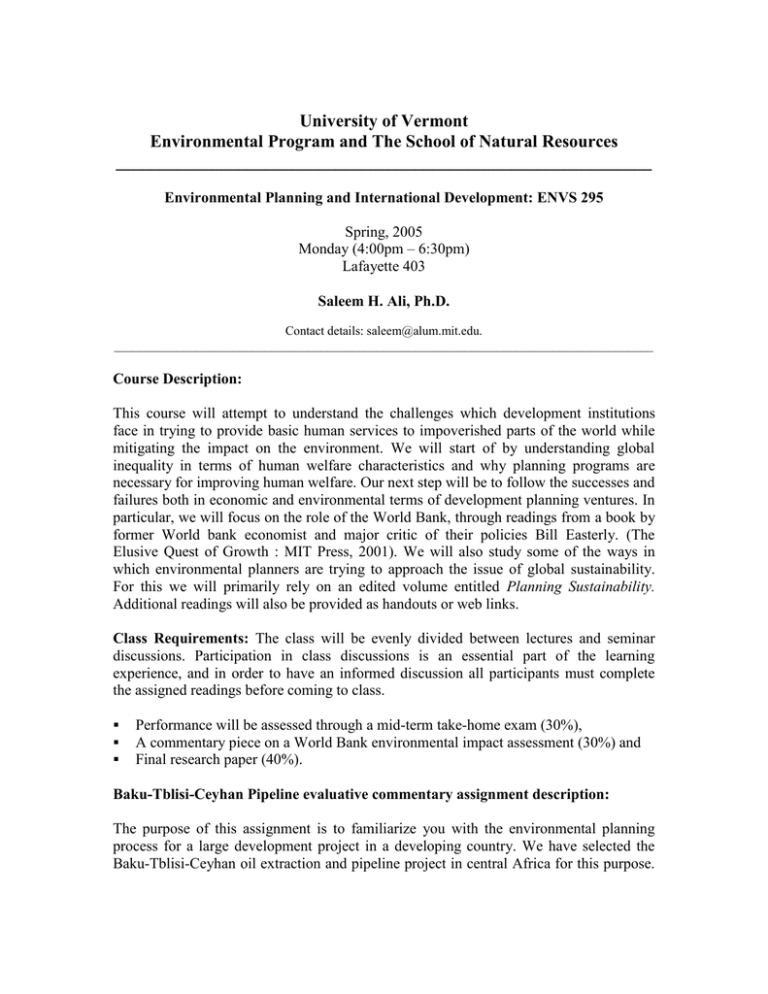
University of Vermont Environmental Program and The School of Natural Resources _____________________________________________________________ Environmental Planning and International Development: ENVS 295 Spring, 2005 Monday (4:00pm – 6:30pm) Lafayette 403 Saleem H. Ali, Ph.D. Contact details: saleem@alum.mit.edu. ______________________________________________________________________________________ Course Description: This course will attempt to understand the challenges which development institutions face in trying to provide basic human services to impoverished parts of the world while mitigating the impact on the environment. We will start of by understanding global inequality in terms of human welfare characteristics and why planning programs are necessary for improving human welfare. Our next step will be to follow the successes and failures both in economic and environmental terms of development planning ventures. In particular, we will focus on the role of the World Bank, through readings from a book by former World bank economist and major critic of their policies Bill Easterly. (The Elusive Quest of Growth : MIT Press, 2001). We will also study some of the ways in which environmental planners are trying to approach the issue of global sustainability. For this we will primarily rely on an edited volume entitled Planning Sustainability. Additional readings will also be provided as handouts or web links. Class Requirements: The class will be evenly divided between lectures and seminar discussions. Participation in class discussions is an essential part of the learning experience, and in order to have an informed discussion all participants must complete the assigned readings before coming to class. Performance will be assessed through a mid-term take-home exam (30%), A commentary piece on a World Bank environmental impact assessment (30%) and Final research paper (40%). Baku-Tblisi-Ceyhan Pipeline evaluative commentary assignment description: The purpose of this assignment is to familiarize you with the environmental planning process for a large development project in a developing country. We have selected the Baku-Tblisi-Ceyhan oil extraction and pipeline project in central Africa for this purpose. This project exemplifies some critical challenges of development that we have been studying in this course: Large influx of capital in an highly impoverished setting Involvement of multilateral donors such as the World Bank Involvement of a large multinational corporation (BP) Transboundary impacts and multiple jurisdictions (Azerbaijan, Georgia, Turkey, Intl. law ) Efforts at transparency for civil society (NGOs) and auditing (International Advisory Group) Your aim in this assignment is to conduct a detailed evaluation of the environmental planning process for the project and provide commentary on the efficacy of institutions and programs established to ensure that this project meets the highest standards of social and environmental performance. The assignment should be structured as a group evaluation report (about 20-25 doublespaced pages in total), entitled “Evaluating the Environmental Planning Processes for the Baku-Tblisi-Ceyhan project.” The questions which the assignment should address are as follows: What are some of the key innovative features of the environmental planning process of this project that distinguish it from other projects of its kind? What are the key technical challenges in the environmental planning of this project and how have they been addressed? Despite these efforts, why are some groups in civil society not satisfied with this planning process? Could the various stakeholders have made some changes to their approach which would have satisfied the various groups? What are your recommendations for improving the implementation of the project in coming years? I would encourage you to use citations and references to web sites, emails, phone conversations and notes from the panel discussion in presenting your report. You can also refer to figures or charts in appendices to your report (appendices can be as long as you like). You should divide tasks for research and review among group members since there is a lot of material available on this project from various sources (listed on the next pag): Text Books: Bill Easterley (2002). The Elusive Quest for Growth. MIT Press. Kenny and Meadocrowft ed. (1998). Plannning Sustainability. Routledge List of Class topics and readings January 24 Introduction: Jeffrey Sachs, The Strategic Significance of Inequality, Web access: http://www.twq.com/01summer/sachs.pdf IPAT Reading on Environmental Kuznets Curves: http://ipat-s.kb-creative.net/Resources/IPAT-S_CaseStudy_EKC.pdf January 31 Economic Theory of Development and Planning: Conflicting Views: Millenium development Goals: http://www.developmentgoals.org/ Easterly, Prologue and Chapter 1 (pp. 1- 20) Reading on development paradigms Kenny and Meadowcroft Ch. 1 and 4 February 7 Financial development assistance: bridging inequality and compensating colonialism? Easterly, Ch. 2, pp. 21-46 Kenny and Meadowcroft, Ch. 2, 3 February 14 Foreign Direct investment and its environmental impact Easterly, Ch. 3, pp. 47-70 Kenny and Meadowcroft, Ch. 6 February 21 President’s day holiday – no class February 28 Education and development: environmental dimensions Easterly, Ch. 4, pp. 71-86 http://www.sadc-reep.org.za/highlight.htm March 7 Economies of Scale: Increasing Returns and Diminishing Ecosystems Easterly, Ch. 8, pp. 145-170 Kenny and Meadowcroft, Ch. 5 March 14 Population and development: the neo-Maltusian imperative Easterly Ch. 5, pp. 87-100 Meadowcroft and Kenny Ch. 9 Mid-term take-home exam handed out on March 9 and due back on March 11 in class. March 21 Spring Break: No classes March 28 BAKU TBLISI CEYHAN CASE STUDY PANEL Heike Mainhardt-Gibbs, Bank Information Center Representative from oil industry Readings web readings as follows (also come prepared with questions based on your own research and group focus areas): Caspian Development site: http://www.caspiandevelopmentandexport.com/ASP/BTC.asp Activist site portal: http://www.bakuceyhan.org.uk/ Bank Information Center site; http://www.bankwatch.org/issues/oilclima/baku-ceyhan/mbaku.html Friends of the Earth site; http://www.foe.org/camps/intl/institutions/bakuceyhan.html April 4 Guest speaker on water and sanitation issues in planning The Technology Factor: Environmental engineering and planning Easterly, Ch. 8, pp. 171-194 Kenny and Meadowcroft, Ch. 8 April 11 Institutions, Governance and Planning: Beyond Serendipity Easterly, Ch. 9 and 10, pp. 195-240 World Development Report, Chapters 3, 7 April 18 Corruption and Growth: Transparency in Environmental Regulations Easterly, Ch. 12, pp. 241-254 Debt and Development: Easterly, Ch. 6 and 7, pp. 101-140 Reading on Debt for Nature Swaps (please try to go through as much of the site as possible) http://www.worldwildlife.org/conservationfinance/swaps.cfm April 25 Early Warning and Planning for Conflict Easterly, Ch. 13, 14 pp. 255-292 Reading from UNEP Early Warning Response Unit May 2 Presentations
